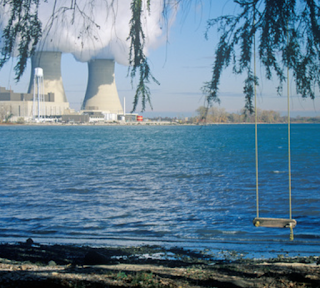Climate Change Reignites Concerns Over Nuclear Storage on Michigan Shores
Michigan hosts three nuclear power plants, with a total of 23 within the Great Lakes watershed. Many of these facilities store their high-level radioactive waste in dry-cask storage units along the shores of Michigan and Canada, raising significant environmental concerns.
Environmental groups have voiced alarm over the approximately 80,000 tons of high-level radioactive waste stored near the Great Lakes. Kevin Kamps, a radioactive waste specialist from Beyond Nuclear, emphasized the dangers posed by the proximity of these storage facilities to major freshwater sources.
"The radiation emitted from this waste can deliver a fatal dose within minutes at close range," Kamps explained. "It's crucial to continuously monitor and 'radiation field' these storage units to prevent exposure and ensure containment."
Citizens' Resistance at Fermi II, a local activist group, is collaborating with other organizations to advocate for safer solutions. They are pushing for the enforcement of "hardened" on-site storage by regulatory bodies like the Nuclear Regulatory Commission, which they believe can better secure nuclear waste and minimize risks.
Responding to these concerns, DTE Energy, operator of the Fermi II plant, stated, "Fermi's used fuel is stored in hardened canisters, protected according to strict federal guidelines and under constant monitoring."
Jesse Deer In Water, a community organizer with Citizens' Resistance at Fermi II, countered claims of safety, stating, "Many people mistakenly believe there are no radiation leaks from these dry-cask storage units."
Deer In Water continued, "The fuel inside remains hot and unstable. Without proper venting, there's a risk of buildup of radioactive gas that could ignite and explode."
DTE Energy maintains that their canisters undergo rigorous testing to withstand natural disasters and ensure safety.
Conclusion: As climate change exacerbates weather extremes, concerns over the storage of nuclear waste along the Great Lakes continue to grow among environmental groups. The debate underscores the importance of robust safety measures and the need for sustainable energy solutions like renewable energy sources.
FAQs:
Why is there concern over storing nuclear waste near the Great Lakes? Storing radioactive waste near major freshwater sources raises risks of radiation exposure, potential leaks, and environmental contamination, which could impact public health and ecosystems.
What is the role of the Nuclear Regulatory Commission in this issue? The Nuclear Regulatory Commission is responsible for overseeing the safety and security of nuclear facilities and ensuring compliance with regulations, including storage of nuclear waste.
#NuclearWaste #GreatLakes #ClimateChange #EnvironmentalHealth #RenewableEnergy

